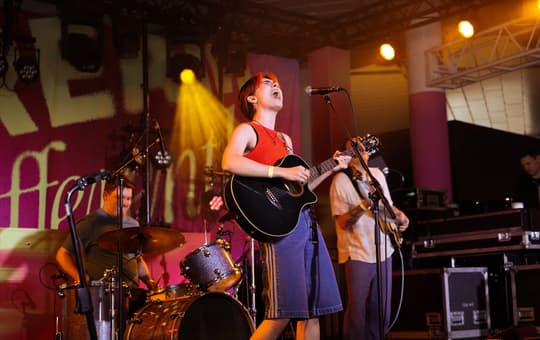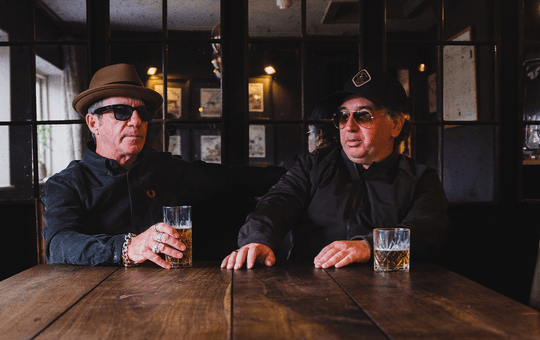In The Grace of Your Love
2011 has, so far, been a strange year in the canon of 21st century pop. On the one hand we’ve had a raft of bold, daring artists pushing back the boundaries of genres and styles – think Calvi, Blake, Ghostpoet, tUNE-yArds and Washed Out, to name but a few – and we’ve also seen more established acts returning to the spotlight. Alongside the Arctic Monkeys, Radiohead, The Streets and The Strokes, are The Rapture, back after a five-year hiatus, one member lighter. However, unlike some of above acts, who are big and successful enough to keep churning out the same old ideas without much fuss, they face a similar dilemma to that which confronted their NYC brethren Mr. Casablancas and co – namely, how should a genre-defining artist attempt a comeback. The problem ‘In The Grace of Your Love’ has is sounding relevant in a world where pop has progressed beyond electro-pop and the 80s revival. In other words, what should The Rapture circa 2011 sound like?
Opening with the huge slab of euphoric disco that is Sail Away, it certainly seems like they want to eschew the darker melodrama that’s currently all the rage in indie-dance. It’s shinier and happier than anything they’ve previously managed, but it’s also something of a curveball, as the rest of ‘In The Grace…’ is a bit of a mixed bag, in both style and sentiment. The hippy dippy musings of the opener gives way to a brooding paean to frontman Luke Jenner’s recently deceased mother, Miss You. Blatantly lifting the drums and rhythm from Pieces of The People We Love, it lacks that track’s clever quirkiness and tries too hard to be sincere. Elsewhere, Come Back To Me tries on accordion euro-pop for size, before inexplicably morphing halfway through into a darker, sparser, more threatening version of the same song – a trick without sense or purpose – while Roller Coaster, all trebly guitars and busy drums, is a weirdly sweet, cheery pop number, like an adult lullaby with matching lyrics (“I know I hurt your head / But if you leave, I’ll be dead”). Jenner even comes across all Brian Wilson over caterwauling guitars on Blue Bird, with all the success that implies.
It’s perhaps no surprise that harking back to their earlier incarnation leads onto far surer ground. The bustling funk of Can You Find Away has a nervous, anxious quality, with Jenner seductively crooning “Maybe if you tried it / You may even like it / Baby you can let yourself go”, whereas the title track, a tight, taut, disco burner, fizzes with menace and Marc Almond synths. A simple, catchy guitar riff neatly frames the spiritual nature of the lyrics, which ask for acceptance with the caveat “Don’t push me around”. The standout here, however, is undoubtedly first single How Deep Is Your Love?, a stonking, piano-driven homage to Chicago house, complete with woozy background horns and sax solo. It’s retro without being pastiche, and reaffirms how, at their best, they’re so effective in compelling the wallflowers to abandon the fringes.
The problem is that that’s a trick which requires a certain amount of chutzpah to pull off – one they are either unwilling, or unable, to contemplate more than a few times. In many recent interviews, they’ve pointedly emphasised their new-found maturity and how pushing a pram around leads to not caring if you’re cool anymore, hence the abandonment of the posturing and disco-punk sound that made them famous. Stating that they “just got tired of being self-involved” and “don’t really care” about the wider cultural impact ‘Echoes’ or, more specifically, House of Jealous Lovers had – “It’s cute to be called the founders of some scene, but I just want to in a really good band” – it seems they’ve got past the angst of the splits, recriminations, and reunions, to just being three happy guys in a band. Love and reconciliation are thrust front and centre – Jenner even used a picture of his dad for the cover – and lyrically deals with second chances and cherishing what you have. Platitudes are littered throughout – “Don’t give up / I’ll see you on the other side”, “You got me flying in your love”, “I’ve run all the darkest races” – and the overall impression is that they’re done trying to impress. Like The Dears earlier this year, the euphoria of still being together has led to an enthusiastic embrace of different styles and templates in place of restraint and selectivity, a case in point being the sax-soul of closer It Takes Time To Be A Man. Maybe they figured their first time fans were similarly burdened by marriage, mortgages, and mewling newborns, and would appreciate something slower. Something more refined. But that comfort blanket of softness has come at a price, and their grown-up take on art-rock is perhaps best appreciated by those unfamiliar with the perils of growing old disgracefully.
7/10













